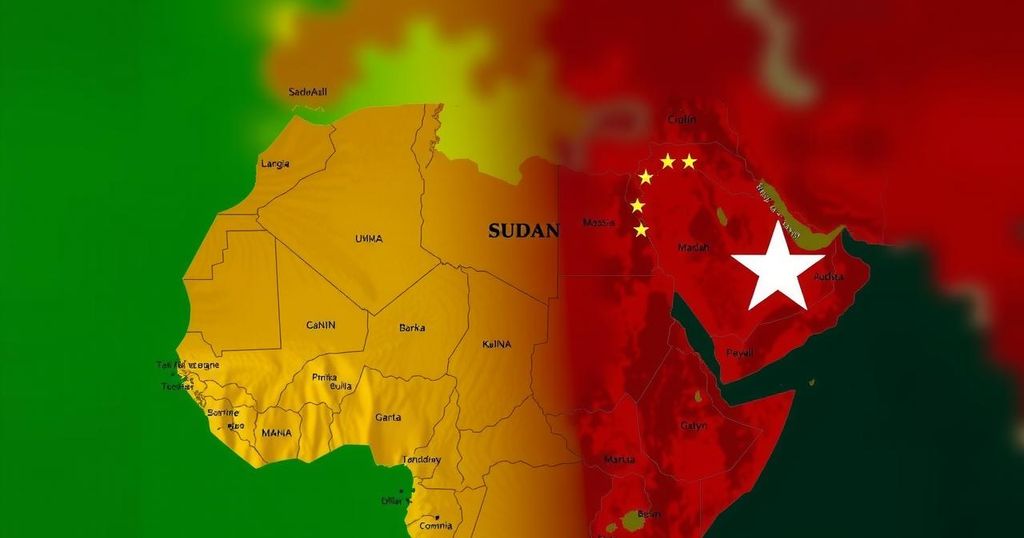The Guardian View on Foreign Powers in Sudan: Struggles Amidst a Humanitarian Crisis
The civil war in Sudan has seen foreign powers deeply involved, exacerbating a humanitarian crisis. The UAE and Saudi Arabia support opposing forces, while the conflict has resulted in widespread death and displacement among civilians. International diplomatic attention has largely overlooked Sudan, and there is urgent need for foreign actors to negotiate peace to alleviate the suffering of the Sudanese population.
The ongoing civil conflict in Sudan has drawn increased scrutiny regarding the involvement of foreign powers, particularly as tensions escalate between the Sudanese Armed Forces (SAF) and the Rapid Support Forces (RSF). The conflict, which commenced in April of last year, has resulted in the deaths of tens of thousands, predominantly among the civilian population. Recently, the United Arab Emirates (UAE) alleged that the SAF bombed its ambassador’s residence in Khartoum, a claim that the SAF has refuted, attributing the attack to the RSF, allegedly supported by the UAE. It is widely acknowledged that both factions are committing serious violations of international humanitarian law, facilitated through a steady influx of arms from foreign governments. The United Nations has reported the use of “starvation tactics” against approximately 25 million civilians, exacerbating what is already the world’s largest hunger crisis. The humanitarian situation remains dire, with 10 million individuals displaced and the spread of diseases like cholera on the rise. Although the autumn harvest is expected to provide temporary relief to food shortages, the long-term outlook remains grim. Both the SAF and RSF have targeted humanitarian volunteers, many of whom previously participated in pro-democracy protests. The manipulation of Sudan’s political unrest by foreign powers underscores the tragedy of Sudanese citizens, who, having worked to oust a dictatorship and establish a civilian government, now face derision at the hands of external interests. Allegations have surfaced regarding UAE support for Hemedti, the leader of the RSF, while Saudi Arabia and Egypt back the SAF under General Abdel Fattah al-Burhan. The situation has been likened to a Middle Eastern conflict manifesting on African soil, yet international diplomatic attention is increasingly focused on ongoing tensions in the broader Middle East. An example of this neglect occurred during a recent meeting between UAE leader Mohamed bin Zayed Al Nahyan and U.S. President Joe Biden, where only minimal mention was made of Sudan. Historically, U.S. engagement has failed to match its rhetorical support for Sudan’s democratic aspirations, particularly under the previous administration, which prioritized initiatives such as the Abraham Accords over comprehensive strategic planning in Sudan. Efforts to negotiate a resolution between the conflicting military factions have faltered. General Burhan appears overly optimistic about his position despite setbacks. A pathway to resolving the crisis in Sudan necessitates collaboration among essential external players, including the UAE, Saudi Arabia, and Egypt. With the United States showing little inclination to intensify pressure, the responsibility shifts to the UK, which holds a leadership role at the UN Security Council, and other nations to assert influence. Notably, the UAE’s public image is of considerable importance; therefore, cultural boycotts and protests from international figures in the arts and sports may exert significant pressure on the UAE’s government to reconsider its actions in Sudan.
The civil war in Sudan has been marked by significant foreign intervention, with various nations exerting influence over the rival factions. The UAE, Saudi Arabia, and Egypt each have vested interests in the outcome of the conflict, particularly regarding strategic resources and regional stability. The situation is complicated further by the humanitarian crisis that has ensued, with the UN highlighting the dire conditions faced by civilians amid the war’s devastation. This context creates an urgent call for international stakeholders to address the escalation of hostilities and to prioritize humanitarian considerations over political and military agendas.
The involvement of foreign powers in Sudan’s civil war has compounded an already tragic humanitarian disaster, with both the SAF and RSF perpetuating violence against civilians, backed by external governments. A potential resolution hinges on the willingness of foreign players to cooperate in seeking peace while prioritizing the needs of the Sudanese people, who have endured significant suffering as a consequence of international interests and conflicts.
Original Source: www.theguardian.com




Post Comment